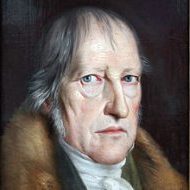Georg Wilhelm Friedrich Hegel’s philosophy had a profound influence on the development of Western thought, and many thinkers and scholars have explored his ideas or reacted to them in different ways. It is difficult to give an exhaustive account of its history. The following is a selection of philosophers, scientists and movements that have engaged with Hegel’s philosophy and reacted to it in a substantial way:
- G.W.F. Hegel’s contemporaries: Schelling and Fichte, for example, were contemporaries of Hegel who were in intellectual exchange with him.
- “Young Hegelians”: A group of philosophers, including Ludwig Feuerbach, Bruno Bauer and Max Stirner, who criticized and reinterpreted Hegel’s ideas in different ways. Feuerbach emphasized materialism and the criticism of religion. In addition, the “Old Hegelians”.
- Karl Marx: Marx developed his own materialist and dialectical philosophy of history, which criticized and transformed Hegel’s idealism, leading to the development of Marxism and communism.
- Friedrich Engels: Engels worked together with Karl Marx and contributed to the development of Marxist theory, which was directed against Hegel’s idealism.
- Arthur Schopenhauer: Schopenhauer criticized Hegel’s idealism and developed his own philosophy, which emphasized the primacy of the will.
- Søren Kierkegaard: Kierkegaard opposed Hegel’s systematization of thought and emphasized individual subjectivity, faith and existential questions.
- Friedrich Nietzsche: Nietzsche criticized Hegel’s rationalism and idealism and dealt with topics such as the “will to power” and the revaluation of values.
- Edmund Husserl: As the founder of phenomenology, Husserl’s philosophy turned against Hegelian idealism and concentrated on the study of conscious experience and perception.
- Martin Heidegger: Heidegger, an important existentialist and phenomenologist, turned against Hegelian philosophy and developed his own philosophical system.
- Maurice Merleau-Ponty: A phenomenologist who reacted to Hegel’s philosophy and developed ideas that stood in contrast to it.
- Pragmatism: Philosophers associated with the American pragmatist tradition, such as Charles Peirce, William James and John Dewey, responded to Hegel’s idealism by emphasizing the practical and experiential aspects of philosophy.
- Analytic philosophy: The analytic tradition, which includes thinkers such as Bertrand Russell and Ludwig Wittgenstein, developed as a reaction to the continental idealism of philosophers such as Hegel in particular. Wittgenstein’s later philosophy came closer to Hegel’s insights. Karl Popper reacted to Hegel.
- Alexandre Kojève has placed Hegel at the center of his thinking.
- Likewise Georg Lukács.
- Existentialism: Existentialist philosophers such as Jean-Paul Sartre and Albert Camus reacted to Hegel’s emphasis on reason and system in favor of individual existence and freedom.
- Post-structuralism and postmodernism: philosophers such as Michel Foucault and Jacques Derrida turned against Hegel’s grand narratives and systems and emphasized the contingency and deconstruction of knowledge.
- Neo-Hegelians: philosophers who attempted to reinterpret Hegel’s ideas and adapt them to contemporary philosophy, such as Josiah Royce and Bradley.
- Critical theory: The Frankfurt School, which included personalities such as Theodor Adorno and Herbert Marcuse, examined and criticized Hegel’s philosophy within the framework of critical theory.
- Jürgen Habermas and Axel Honneth, who probably belong to the second generation of the Frankfurt School, have dealt intensively with Hegel. The former divides the history of philosophy from the 19th century onwards into those who follow Hume and those who follow the Young Hegelians.
- The social philosophers Seyla Benhabib and Judith Butler wrote their doctorates on Hegel and later continued to study his philosophy.
- Wilhelm Dilthey, Leo Strauss, Julius Binder, Karl Larenz, Slavoj Žižek, Rosi Braidotti, Victor Stoichita, Bruno Latour, Armin Nassehi, Hélène Cixous, John McDowell and many more.
